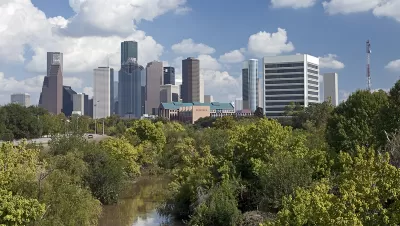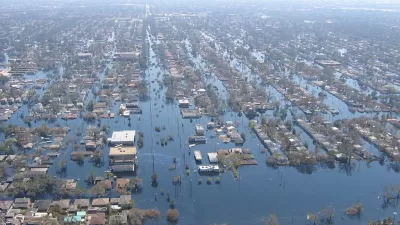Those were the words President Trump expressed before his first trip to Texas while Hurricane Harvey was ravaging Houston. But experts worry that the rebuilding won't be better due to the recision of an Obama-era environmental regulation.

Houston may be rebuilt bigger, but Trump himself made the job of rebuilding better much more difficult due to his rush to rollback all those 'burdensome' environmental regulations and restrictions enacted by his predecessor.
As Planetizen editor James Brasuell posted last month, the president held an impromptu press conference at Trump Tower on Aug. 15, supposedly on infrastructure after signing an executive order: "Establishing Discipline and Accountability in the Environmental Review and Permitting Process for Infrastructure." [Also see White House remarks on the order.]
But after Trump was peppered with questions from journalists about the Charlottesville violence, particularly after he stated that "fine people" had marched with neo-Nazis and white supremacists, that executive order was history from a media perspective. After Harvey made landfall near Corpus Christi, Texas on Aug. 25 as a category 4 hurricane, it's now back in the news.
NPR's science correspondent, Christopher Joyce, takes it from here: [audio available]
Two years ago, President Obama issued an executive order designed to help communities rebuild after floods. It covered projects that use federal funds - bridges, hospitals, sewage treatment plants. They had to be built higher and stronger to withstand future disasters, especially as climate change brought wetter storms. Two weeks ago, President Trump rescinded that order.
Flood expert Rob Moore of the Natural Resources Defense Council likens Trump's executive order to rebuilding to the same standards that were in place before the floods, and condemning Houston to similar destruction from future hurricanes.
Michael Gerrard, a professor of environmental and climate change law at Columbia University, was even more direct in a concise analysis by Michael Biesecker and Joan Lowy for the Associated Press on how the recision undermines the rebuilding of America's fourth largest city.
“Rebuilding while ignoring future flood events is like treating someone for lung cancer and then giving him a carton of cigarettes on the way out the door,” said Gerrard. “If you’re going to rebuild after a bad event, you don’t want to expose yourself to the same thing all over again.”
However, not all groups opposed the rollback, report Valerie Volcovici and Jeff Mason for Reuters:
Business groups praised the streamlining of regulations, while environmental groups and others criticized the order, saying it would lead to riskier projects, waste taxpayer dollars and result in a “climate catastrophe.”
The American Petroleum Institute said in a statement that the order reflects recommendations the oil industry lobby group submitted to the Commerce Department in March. The National Association of Home Builders also praised the Trump administration’s move, saying the flood rules had raised the cost of housing.
J.R. Lehmann, senior fellow at the free-market research group, R Street Institute, told NPR that effective rebuilding "means more than elevating buildings after floods. It means getting people to stop building in hazardous areas."
"Most of the increase in disasters is not actually due to changes in the weather but changes in human living patterns," he added.
Federal Emergency Management Agency (FEMA)
Another way Trump's budget-cutting policies will impact Houstonians is by cutting "$667 million from FEMA state and local grant funding for programs that include disaster preparedness and response" in his fiscal year 2018 budget, writes Howard A. Learner for HuffPost. In addition, Trump's budget "[e]liminates all $190 million of funding for the National Flood Insurance Program’s Flood Hazard Mapping and Risk Analysis Program."
"What the Trump administration doesn't seem to understand is that these flood maps are used for decisions at every level of government," states NRDC's Moore.
"They're used by private developers for deciding where it is safe to build and what kinds of standards do we need to build to in order to be safeguarded against flooding?"
Articles referenced above:
- Analysis | Trump executive order undermines rebuilding better for future floods [AP, Aug. 30]
- Hurricane Harvey Should Be A Wake-Up Call To Trump’s Disaster Relief Budget [HuffPost, Aug. 27]
- Trump infrastructure push rolls back environmental rules [Reuters, Aug. 15]
Correspondent's note: Planetizen has several posts tagged ReBuild Houston, the city's "initiative to improve the quality of life and mobility for residents of the city by rebuilding our drainage and street infrastructure." The program was authorized by voters' approval of Proposition One on November 2, 2010.
FULL STORY: Trump Policies Could Undermine Post-Harvey Rebuilding

Planetizen Federal Action Tracker
A weekly monitor of how Trump’s orders and actions are impacting planners and planning in America.

Congressman Proposes Bill to Rename DC Metro “Trump Train”
The Make Autorail Great Again Act would withhold federal funding to the system until the Washington Metropolitan Area Transit Authority (WMATA), rebrands as the Washington Metropolitan Authority for Greater Access (WMAGA).

The Simple Legislative Tool Transforming Vacant Downtowns
In California, Michigan and Georgia, an easy win is bringing dollars — and delight — back to city centers.

The States Losing Rural Delivery Rooms at an Alarming Pace
In some states, as few as 9% of rural hospitals still deliver babies. As a result, rising pre-term births, no adequate pre-term care and "harrowing" close calls are a growing reality.

The Small South Asian Republic Going all in on EVs
Thanks to one simple policy change less than five years ago, 65% of new cars in this Himalayan country are now electric.

DC Backpedals on Bike Lane Protection, Swaps Barriers for Paint
Citing aesthetic concerns, the city is removing the concrete barriers and flexposts that once separated Arizona Avenue cyclists from motor vehicles.
Urban Design for Planners 1: Software Tools
This six-course series explores essential urban design concepts using open source software and equips planners with the tools they need to participate fully in the urban design process.
Planning for Universal Design
Learn the tools for implementing Universal Design in planning regulations.
Smith Gee Studio
City of Charlotte
City of Camden Redevelopment Agency
City of Astoria
Transportation Research & Education Center (TREC) at Portland State University
US High Speed Rail Association
City of Camden Redevelopment Agency
Municipality of Princeton (NJ)





























